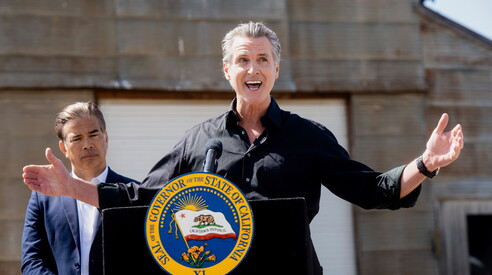
Foto ANSA
Il foglio tradotto
What else can Europe do, mocked by the illiberal traitors of the west
Tell it better, the fairy tale of european sovereignty, strategic ambiguity, and the special bond. Those who betray Europe should not be asked for “security guarantees” but should be met with combative policies
A gang of scoundrels, fraudsters, and snake oil salesmen disguised as statesmen and spokesmen for the people and peace—riffraff devoted to the less honorable aspects of the noble trade in humans and rare earths, candidates for both the Nobel Prize and the Oscar for shamelessness—has seized power in Washington by the most dangerous route: electoral or plebiscitary. Now, as they work to dismantle the U.S. Constitution and the separation of powers, as they rap the knuckles of allies with whom they share nearly eighty years of transatlantic history—victors together in the Cold War against the Soviet world—they intend to harass and humiliate a courageous people who have been fighting for three years for their survival, their political identity, and the defense of a piece of European sovereignty.
With a million fallen on the battlefield. With three long winters in the cold, under threat from a power ten times greater, poorly armed, and constrained by debilitating anti-escalation red lines. These Cossacks have done more for Europe than Jean Monnet and company, infinitely more than the feckless participants of the Paris summit, who obsequiously ask this gang—gathered in Saudi Arabia with the tyrant of Moscow—for "security guarantees." Let it be repeated: security guarantees.
After a ceasefire that will be dressed up as a just peace and the restoration of global prosperity—facilitated by the extraction of rare earths as compensation for the arms appropriations of the U.S. Congress and the support of the Biden presidency—toward a new world order marked by the convergence of an illiberal Western democracy and the great Eurasian autocracies. Call things by their name. What remains to be seen is whether there will be a Ukrainian variant and a European variant in this inherently fragile, petty, and potentially irrelevant game of diverting and reversing the course of history.
In fact, the Ukrainian variant has already existed. His name is Zelensky—the accidental president who refused to be evacuated into exile in the United States and instead asked for weapons and ammunition to defend his homeland. This, at a time when the Russians, undeterred and fully aware of Europe's vassalized and commodified condition, had already swallowed the road to Kyiv with their tanks, convicts, and mercenaries, aiming for a full sweep while leaving behind the massacres of Bucha and a capital plunged into darkness. So, a variant did exist. And it could manifest itself again, as shown by the Ukrainian president—Jewish and a former comedian—who has little inclination to perform a Yiddish dance before the superpowers of Arabia.
Over time, Zelensky has become the symbol of an attempt at Western and European resurgence, later worn down and reduced to a kind of begging petulance by the sullen inefficacy of the West’s reluctant will to power. Now, he is being challenged to run for re-election as the warrior president who lost the fight and must step aside—after yet another rap on the knuckles—to make way for the usual puppets who have circled around the golden domes of Little Russia since the days of Maidan.
While Bin Salman welcomes the negotiator of Russian funds, ready for new deals at the expense of Ukrainians—and of the cowards who kept them on the front lines without giving them the means to win in their own defense—those same people now take pride in gathering for an informal and extraordinary summit, splitting into so-called "resisters" and so-called "mediators." As they abandon Eastern Europe, undermine the credibility of the EU and NATO, and prepare to serve as chorus singers for the return of a demonic peace, they demand, of all things, security guarantees—like a collection of Chamberlain and Daladier figurines.
The European variant is missing. Perhaps everyone thinks this is the time to avoid stirring the waters, to reflect with caution, to fix a mechanism that the capricious and narcissistic child—an embodiment of majority public opinion in America—has smashed to pieces. Perhaps many are uneasy about Vance and Peter Thiel, believing that the tech-optimists, in the style of Milei, have the political muscle to impose themselves on a world that no longer recognizes itself—a pre-digital history made of lessons and books, treaties and embassies, old-school politics, imperial power elites, financial aristocracies, and pacts that foster social progress and the orderly integration of the masses into the state, generating and safeguarding liberal democratic institutions.
Instead, the bluff of Washington’s poker players and Moscow’s grim overlords must be called. The European variant lies in leadership that steps forward and declares: when treaties are torn up, they should be considered void or renegotiated; when alliances and borders in Europe are played with, then all bets are off. In such cases, ambassadors are summoned, armed forces are mobilized, and symmetrical political force is exerted on America—or whatever remains of it. Signals of political combativeness must be sent, money and weapons committed—rather than begging the betrayers of Europe and the West for security guarantees. That should be left to those who are afraid of their own shadow and drowning in hypocrisy.
Poor Starmer, in Washington to be lectured by Musk’s friend, the same man who wants him jailed as an accomplice to rape. But go ahead—tell the fairy tale of European sovereignty, strategic ambiguity, and the special bond a little better. Germany, the UK, France—even poor Italy, saddled with a deputy prime minister wearing a Putin T-shirt, humiliated by a right-wing mayor on the Polish border—can do something other than fawn over a naked king, spanked with the cover of Forbes, while stripping down themselves.
This article is translated by artificial intelligence. If you want to report errors you can write to [email protected]






